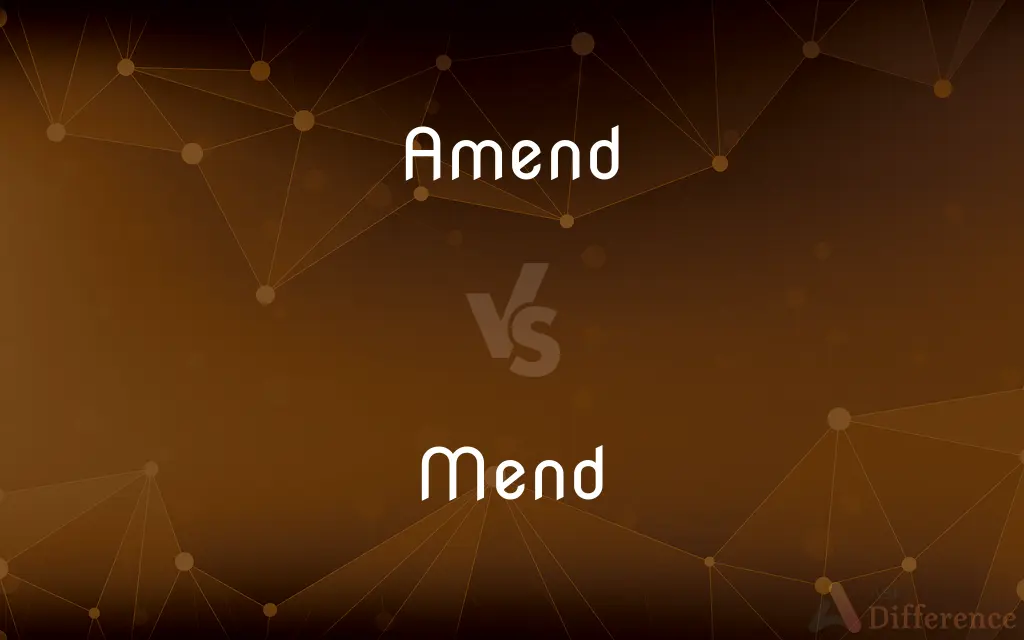Amend vs. Mend — What's the Difference?
By Urooj Arif & Maham Liaqat — Updated on May 2, 2024
Amend refers to making changes to improve something, typically documents or laws, whereas mend involves repairing or fixing something broken or damaged.

Difference Between Amend and Mend
Table of Contents
ADVERTISEMENT
Key Differences
Amend is often used in the context of modifying legal documents, policies, or texts to make improvements or correct errors, emphasizing the enhancement of content. Whereas mend is primarily associated with the repair of physical items or relationships, focusing on restoring them to their former condition.
In legislative processes, to amend a law means to alter its provisions, often to adapt to new circumstances or insights. On the other hand, to mend in social contexts refers to reconciling differences and rebuilding trust.
When you amend a statement, you are refining or adding to it to convey a clearer or more correct message, whereas mending a statement would imply correcting a misstatement or resolving a misunderstanding caused by it.
In usage, amend appears frequently in formal and written contexts, reflecting its association with official adjustments. Mend, however, is common in everyday language, suggesting its practical nature in dealing with physical and emotional repair.
The concept of amending implies a proactive approach to enhancement and optimization, whereas mending often involves reactive measures to fix what has been broken.
ADVERTISEMENT
Comparison Chart
Definition
Modify for improvement
Repair, fix
Common Usage
Documents, laws, statements
Objects, relationships
Connotation
Improvement, enhancement
Restoration, recovery
Formality
More formal
Less formal
Example Context
Amending a constitution
Mending a broken vase
Compare with Definitions
Amend
To make minor changes to (something, typically a text) in order to make it fairer, more accurate, or more up-to-date.
The company amended its policies after receiving feedback.
Mend
To return to health; heal.
It took months for his leg to mend after the surgery.
Amend
To improve or correct.
He amended his way of speaking to the audience.
Mend
To fix or resolve (a mistake or misunderstanding).
He apologized to mend the oversight in the report.
Amend
To enhance or better oneself.
She took courses to amend her skills.
Mend
To patch up or repair (a hole or tear in clothing).
He mended his socks instead of buying new ones.
Amend
To formally alter or add to (a motion or bill).
Lawmakers voted to amend the legislation.
Mend
To repair (something that is broken or damaged).
She mended the torn dress with a needle and thread.
Amend
To revise (written material).
The author amended the manuscript based on the editor’s suggestions.
Mend
To improve an unpleasant situation.
They are working to mend their strained relationship.
Amend
Make minor changes to (a text, piece of legislation, etc.) in order to make it fairer or more accurate, or to reflect changing circumstances
The rule was amended to apply only to non-members
Mend
To make repairs or restoration to; fix.
Amend
Improve the texture or fertility of (soil)
Amend your soil with peat moss or compost
Mend
To reform or correct
Mend one's ways.
Amend
To change for the better; improve
"The confinement appeared to have had very little effect in amending his conduct" (Horatio Alger).
Mend
To improve in health or condition
The patient is mending well.
Amend
To alter the wording of (a legal document, for example) so as to make more suitable or acceptable.
Mend
To heal
The bone mended in a month.
Amend
To enrich (soil), especially by mixing in organic matter or sand.
Mend
To make repairs or corrections.
Amend
To better one's conduct; reform.
Mend
The act of mending
Did a neat mend on the sock.
Amend
(transitive) To make better; improve.
Mend
A mended place
You can't tell where the mend is.
Amend
(intransitive) To become better.
Mend
A place, as in clothing, which has been repaired by mending.
Amend
To heal (someone sick); to cure (a disease etc.).
Mend
The act of repairing or recovering.
My trousers have a big rip in them and need a mend.
Amend
To be healed, to be cured, to recover (from an illness).
Mend
(transitive) To repair (something that is torn, broken, defaced, decayed, or otherwise damaged)
My trousers have a big rip in them and need mending.
When your car breaks down, you can take it to the garage to have it mended.
Amend
(transitive) To make a formal alteration (in legislation, a report, etc.) by adding, deleting, or rephrasing.
Mend
(transitive) To put in a better state; to set right; to reform;
Her stutter was mended by a speech therapist.
My broken heart was mended.
Amend
An act of righting a wrong; compensation.
Mend
To quicken
Amend
Clip of amendment
I've sent over a new version of the doc with some amends.
Mend
(transitive) To help, to advance, to further; to add to.
Amend
To change or modify in any way for the better
Mar not the thing that can not be amended.
An instant emergency, granting no possibility for revision, or opening for amended thought.
We shall cheer her sorrows, and amend her blood, by wedding her to a Norman.
Mend
(intransitive) To grow better; to advance to a better state; to become improved.
Amend
To grow better by rectifying something wrong in manners or morals; to improve.
Mend
To repair, as anything that is torn, broken, defaced, decayed, or the like; to restore from partial decay, injury, or defacement; to patch up; to put in shape or order again; to re-create; as, to mend a garment or a machine.
Amend
Make amendments to;
Amend the document
Mend
To alter for the better; to set right; to reform; hence, to quicken; as, to mend one's manners or pace.
The best service they could do the state was to mend the lives of the persons who composed it.
Amend
To make better;
The editor improved the manuscript with his changes
Mend
To help, to advance, to further; to add to.
Though in some lands the grass is but short, yet it mends garden herbs and fruit.
You mend the jewel by the wearing it.
Amend
Set straight or right;
Remedy these deficiencies
Rectify the inequities in salaries
Repair an oversight
Mend
To grow better; to advance to a better state; to become improved; to recover; to heal.
Mend
Sewing or darning that repairs a worn or torn hole (especially in a garment);
Her stockings had several mends
Mend
The act of putting something in working order again
Mend
Restore by replacing a part or putting together what is torn or broken;
She repaired her TV set
Repair my shoes please
Mend
Heal or recover;
My broken leg is mending
Common Curiosities
Can amend be used in reference to personal behavior?
Yes, one can amend personal behavior as part of self-improvement.
Is amend used in legal contexts?
Yes, amend is frequently used in legal contexts to modify laws or policies.
What are typical situations where mend is used?
Mend is typically used for repairing objects or healing relationships.
What does it mean to amend a document?
Amending a document involves making changes to its content to improve or update it.
Is amending always related to text?
While commonly associated with text, amending can apply to any adjustment made for improvement.
How formal is the use of amend?
Amend is more formal and often used in written, official, or legal contexts.
Can mend be used figuratively?
Yes, mend can be used figuratively to mean improving or fixing non-physical issues.
How does amend differ from revise?
Amend generally implies modifications for improvement, whereas revise can involve more extensive changes.
Can mend refer to physical healing?
Yes, mend can refer to the process of a body healing from injury.
What does it mean to mend a relationship?
To mend a relationship means to repair or restore it, often by resolving conflicts and rebuilding trust.
What does mend mean in the context of clothing?
In clothing, mend means to repair damage like tears or holes.
Is there a difference in the urgency between amend and mend?
Mend often implies a more immediate action to fix something broken, whereas amend may not imply urgency.
What is the result of amending a policy?
Amending a policy usually leads to updates that reflect new standards or corrections.
Share Your Discovery

Previous Comparison
Nosegay vs. Bouquet
Next Comparison
Skunk vs. OpossumAuthor Spotlight
Written by
Urooj ArifUrooj is a skilled content writer at Ask Difference, known for her exceptional ability to simplify complex topics into engaging and informative content. With a passion for research and a flair for clear, concise writing, she consistently delivers articles that resonate with our diverse audience.
Co-written by
Maham Liaqat















































